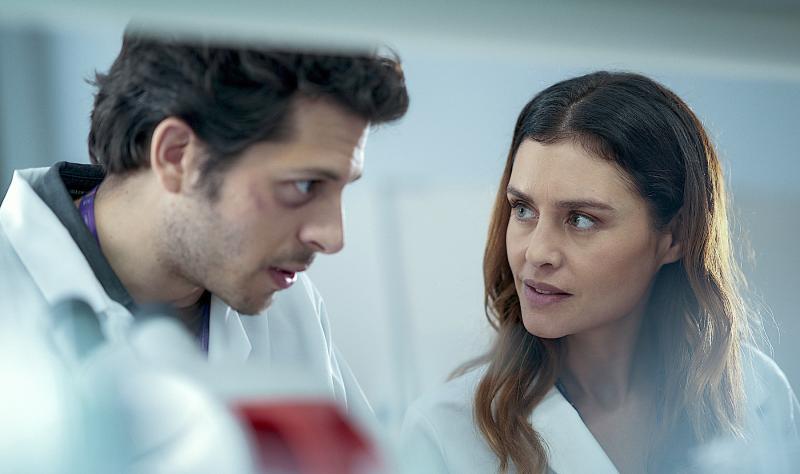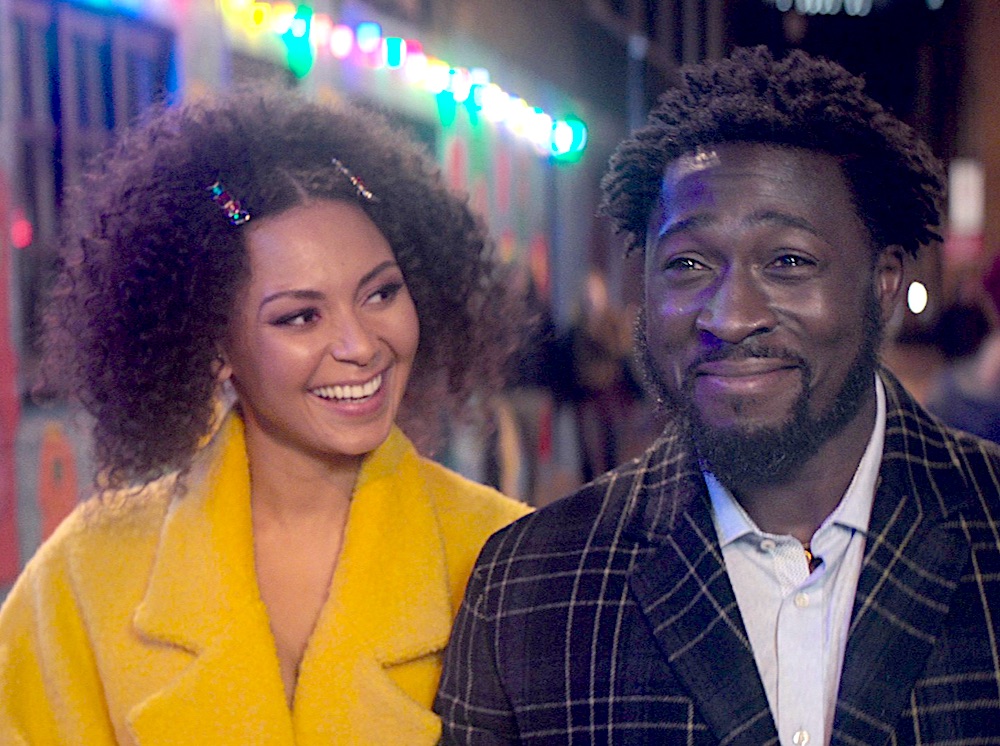The One, Netflix review - the downside of scientific matchmaking | reviews, news & interviews
The One, Netflix review - the downside of scientific matchmaking
The One, Netflix review - the downside of scientific matchmaking
John Marrs's novel transformed out of all recognition

Readers of John Marrs’s 2017 novel The One should probably look away now, since Netflix’s dramatisation of the story bears scant resemblance to the book.
By and large, this is not a good thing. The One has a chilly futuristic sheen to it, with everybody living and working in buildings that look like advertisements from a team of deluxe architects (locations include London’s Barbican and the new Kings Cross development). Unfortunately the characters feel semi-frozen too, radiating little in the way of human warmth. They tend to deliver their lines with a blank matter-of-factness, as if this was a read-through rather than the finished product.
The problem is epitomised by the lead character Rebecca Webb (Hannah Ware). It’s she who, in partnership with fellow PhD scientist James Whiting (Dimitri Riviera Leonidas), created the technology behind “The One”, as they call it (James supposedly got the idea from studying the behaviour of fire ants). Rebecca is ruthless and driven, and her steely single-mindedness has powered growth of The One and made it a spectacular global success. Snag is, Rebecca is also charmless and unscrupulous, treating even her so-called friends with supercilious contempt. Her burly minder Connor (Diarmaid Murtagh) never leads her side, since threats and intimidation may be required at any time. The fact that she stole a huge DNA database from the computer of her friend Ben (Amir El-Masry), with whom she lived before The One hit the big time, threatens to be the fatal flaw in her masterplan. The theft prompts a ferocious falling-out with Ben, and Ben’s unexplained violent death ticks away under the narrative as a police investigation gradually closes in on the truth.
The fact that she stole a huge DNA database from the computer of her friend Ben (Amir El-Masry), with whom she lived before The One hit the big time, threatens to be the fatal flaw in her masterplan. The theft prompts a ferocious falling-out with Ben, and Ben’s unexplained violent death ticks away under the narrative as a police investigation gradually closes in on the truth.
Aside from the thriller-esque trappings, The One aims to illustrate how disastrous an invention like this could prove to be by showing us its effects on the subsidiary characters. Hannah (Lois Chimimba) is in a seemingly happy relationship with husband Mark (Eric Kofi-Abrefa, pictured above with Chimimba), but idiotically gets Mark’s DNA analysed without telling him. When the results match him with Megan (Pallavi Sharda), chaos predictably erupts.
Police detective Kate Saunders (Zöe Tapper) has lovely hair, and seems to spend more time organising her social life than doing any detecting. When The One matches her with a Spanish woman, Sophia (Jana Pérez), it drops her into a farcically complicated tangle of secrets and lies, about which it’s difficult to care one way or the other.
Rebecca herself pretends to have been matched with Ethan (Wilf Scolding), but he’s a heartbroken gay man with no discernible personality and is mere window-dressing for Rebecca’s public appearances. Rebecca’s true “One” proves to be Matheus (Albano Gerónimo), a surfer-bum from Tenerife with a sleazy con-man for a brother. Let’s face it, that’s never gonna work.
There’s a good idea in here somewhere, but this isn’t the TV treatment it deserved.
Add comment
The future of Arts Journalism
You can stop theartsdesk.com closing!
We urgently need financing to survive. Our fundraising drive has thus far raised £49,000 but we need to reach £100,000 or we will be forced to close. Please contribute here: https://gofund.me/c3f6033d
And if you can forward this information to anyone who might assist, we’d be grateful.

Subscribe to theartsdesk.com
Thank you for continuing to read our work on theartsdesk.com. For unlimited access to every article in its entirety, including our archive of more than 15,000 pieces, we're asking for £5 per month or £40 per year. We feel it's a very good deal, and hope you do too.
To take a subscription now simply click here.
And if you're looking for that extra gift for a friend or family member, why not treat them to a theartsdesk.com gift subscription?
more TV
 Mr Scorsese, Apple TV review - perfectly pitched documentary series with fascinating insights
Rebecca Miller musters a stellar roster of articulate talking heads for this thorough portrait
Mr Scorsese, Apple TV review - perfectly pitched documentary series with fascinating insights
Rebecca Miller musters a stellar roster of articulate talking heads for this thorough portrait
 Down Cemetery Road, Apple TV review - wit, grit and a twisty plot, plus Emma Thompson on top form
Mick Herron's female private investigator gets a stellar adaptation
Down Cemetery Road, Apple TV review - wit, grit and a twisty plot, plus Emma Thompson on top form
Mick Herron's female private investigator gets a stellar adaptation
 theartsdesk Q&A: director Stefano Sollima on the relevance of true crime story 'The Monster of Florence'
The director of hit TV series 'Gomorrah' examines another dark dimension of Italian culture
theartsdesk Q&A: director Stefano Sollima on the relevance of true crime story 'The Monster of Florence'
The director of hit TV series 'Gomorrah' examines another dark dimension of Italian culture
 The Monster of Florence, Netflix review - dramatisation of notorious Italian serial killer mystery
Director Stefano Sollima's four-parter makes gruelling viewing
The Monster of Florence, Netflix review - dramatisation of notorious Italian serial killer mystery
Director Stefano Sollima's four-parter makes gruelling viewing
 The Diplomat, Season 3, Netflix review - Ambassador Kate Wyler becomes America's Second Lady
Soapy transatlantic political drama keeps the Special Relationship alive
The Diplomat, Season 3, Netflix review - Ambassador Kate Wyler becomes America's Second Lady
Soapy transatlantic political drama keeps the Special Relationship alive
 The Perfect Neighbor, Netflix review - Florida found-footage documentary is a harrowing watch
Sundance winner chronicles a death that should have been prevented
The Perfect Neighbor, Netflix review - Florida found-footage documentary is a harrowing watch
Sundance winner chronicles a death that should have been prevented
 Murder Before Evensong, Acorn TV review - death comes to the picturesque village of Champton
The Rev Richard Coles's sleuthing cleric hits the screen
Murder Before Evensong, Acorn TV review - death comes to the picturesque village of Champton
The Rev Richard Coles's sleuthing cleric hits the screen
 Black Rabbit, Netflix review - grime and punishment in New York City
Jude Law and Jason Bateman tread the thin line between love and hate
Black Rabbit, Netflix review - grime and punishment in New York City
Jude Law and Jason Bateman tread the thin line between love and hate
 The Hack, ITV review - plodding anatomy of twin UK scandals
Jack Thorne's skill can't disguise the bagginess of his double-headed material
The Hack, ITV review - plodding anatomy of twin UK scandals
Jack Thorne's skill can't disguise the bagginess of his double-headed material
 Slow Horses, Series 5, Apple TV+ review - terror, trauma and impeccable comic timing
Jackson Lamb's band of MI5 misfits continues to fascinate and amuse
Slow Horses, Series 5, Apple TV+ review - terror, trauma and impeccable comic timing
Jackson Lamb's band of MI5 misfits continues to fascinate and amuse
 Coldwater, ITV1 review - horror and black comedy in the Highlands
Superb cast lights up David Ireland's cunning thriller
Coldwater, ITV1 review - horror and black comedy in the Highlands
Superb cast lights up David Ireland's cunning thriller
 Blu-ray: The Sweeney - Series One
Influential and entertaining 1970s police drama, handsomely restored
Blu-ray: The Sweeney - Series One
Influential and entertaining 1970s police drama, handsomely restored

Comments
If you're thinking of